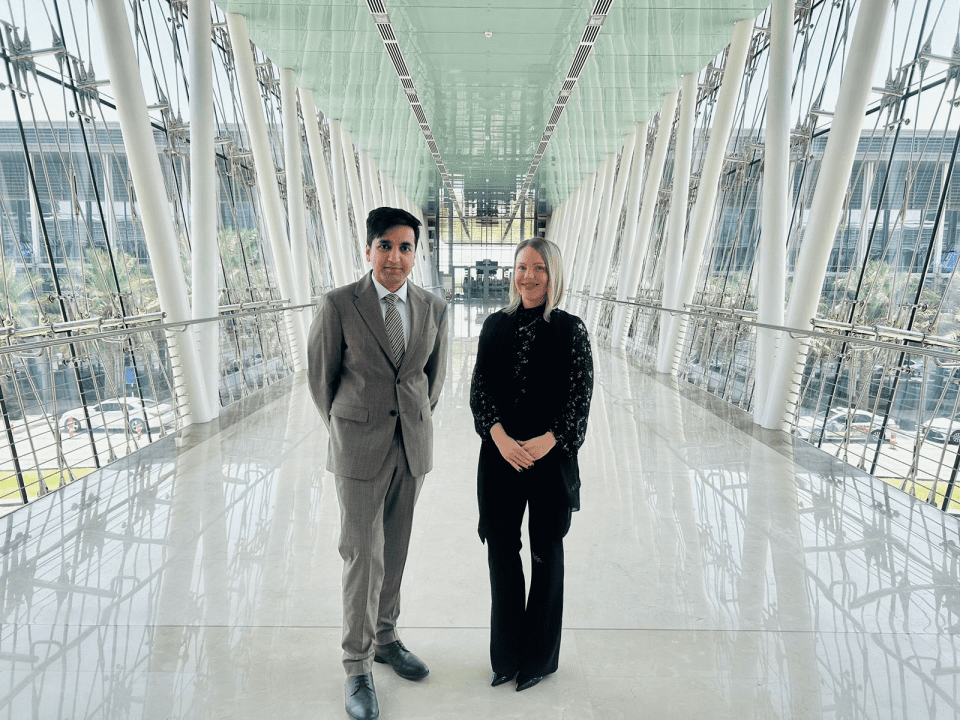In the fast-paced world of healthcare, an interview with Dr. Usaama Sheikh, a critical care consultant at Sheikh Shakhbout Medical City (SSMC) in Abu Dhabi is invaluable. With a wealth of experience and a commitment to advancing critical care practices, Dr. Usaama Sheikh stands at the forefront of medical innovation. In an exclusive interview, Dr. Usaama Sheikh shares his journey, the advancements in critical care, and his vision for the future of healthcare in Abu Dhabi.
Dr. Usaama Sheikh is a critical care consultant from the UK with dual certification in intensive care medicine and anesthesia. Dr. Usaama possesses advanced training and expertise in medical and surgical critical care, major trauma, and burns. He is a Fellow of the Faculty of Intensive Care Medicine and the Royal College of Anaesthetists, as well as a Member of the Intensive Care Society and the Association of Anesthetists of Great Britain and Ireland.
Dr. Usaama was a consultant in anesthesia and intensive care medicine at Leeds Teaching Hospitals NHS Trust before relocating to Abu Dhabi in February 2024.
At Allocation Assist, we enjoy keeping in touch with our doctors after they relocate. It was great to catch up with Dr. Usaama and find out how he has been getting along since moving to the UAE.
Thank you for making time to share your relocation experience, Dr. Usaama. Can you first tell us about your training and why you chose to specialize in critical care?
I grew up in Sheffield and went to medical school at the University of Leeds. After graduation, I wanted to stay in the Leeds area for my specialist training. In the UK, all medical graduates enter a two-year foundation training program in which they gain experience in a range of medical and surgical specialties. This provides a broad-based understanding of different specialties and a great opportunity to discover which specialty you are best suited to.
I completed dual specialist training, first in anesthesia and then in critical care. Critical care appealed to me as a specialty, as it gives a good mix of book knowledge and practical hands-on treatment. It is a very rewarding specialty where you are able to make a difference for very sick patients. I like to be able to spend more time with smaller groups of patients, getting to know them and their families.
There is an emphasis on good communication and teamwork with many other specialties, which suits my personality. Of course, the demands of working in an acute specialty require a commitment to regular out-of-hours work, including weekends and public holidays. However, the rewards outweigh the demands when you see patients get better and are able to help them and their families through difficult and stressful times.
Is it common to do dual-specialist consultant training in anesthesia and critical care?
In the UK in particular, intensive care, also known as critical care, started as a subspecialty of anesthesia. While doctors with specialist training in anesthesia work in intensive care, critical care has developed into a specialty in its own right. The COVID-19 pandemic led to an increased recognition of the need for critical care consultants and an increase in training posts.
Doctors specializing in critical care may also come from different specialist backgrounds, such as acute medicine, respiratory, renal, or emergency medicine. Having dual training in anesthesia and critical care has given me advanced airway skills and expertise in the use of ventilators and other procedures. However, in the ICU, we have consultants with different backgrounds and training. This is essential as we work as a team, utilizing our wide-ranging knowledge and skills from different specialties.
Why did you decide to relocate to the United Arab Emirates?
I had visited the UAE many times before, for a holiday or layover when traveling. My parents also worked in Dubai over 10 years ago, for 3 or 4 years, and I visited them during that time. I absolutely loved the culture, lifestyle, and weather in the UAE, so I suppose it was always going to be on my list when I started to consider relocating. I have a great appreciation for the National Health Service in the UK and the utmost respect for my colleagues and all the other staff who work extremely hard in the NHS.
However, due to capacity issues, resources have become more thinly spread, and I found that it was increasingly becoming more difficult to provide the level of care that I wanted for my patients. So, I started to think about making a move. In Arabian Gulf countries, such as the UAE, specialist training and qualifications from the UK are recognized and highly valued, so this makes the medical licensing and transition process easier than in some other parts of the world.
While searching on LinkedIn, I stumbled across Allocation Assist’s profile, where I found a lot of helpful information about the health sector in the UAE and information on lifestyle and relocation considerations for doctors. I contacted Emilie and her team at Allocation Assist, who helped me with my medical licensing and started connecting me to large tertiary hospitals in the UAE.
Why did you choose Abu Dhabi and Sheikh Shakhbout Medical City (SSMC) in particular?
SSMC is a very large tertiary hospital, with state-of-the-art facilities and pretty much every specialty available. It is also a referral center for trauma, burns, medical oncology, and hematology, amongst other specialties. This means that SSMC receives an interesting and varied case mix. We see a wide range of different conditions and patients undergoing complex surgical procedures.
As an intensive care physician, it is important to keep up my skills, and this requires being a part of a large organization that can provide the full range of treatments. Prior to interviewing for my current post, there was another consultant job advertised in one of the top hospitals in Dubai. It would also have been a great fit for my training and skills, but ultimately I decided on Abu Dhabi. Both are great places to live, but Dubai is a bit busier with a faster pace of life. When I was considering what to do, I read a blog on Allocation Assist’s page comparing the lifestyle between different emirates in the UAE, and this confirmed to me that Abu Dhabi would be the best place for our family, with three young children, as it is very family-friendly and the pace of life is a bit slower.
How did you find the relocation process?
The entire process, from first thinking about relocating to the UAE to starting my new job in Abu Dhabi, took less than a year. Things can move very quickly here! Thanks to the licensing team at Allocation Assist, the process of obtaining my license to work in the UAE went very smoothly; I had to do nothing but supply all my documents.
Allocation Assist also provided helpful information on international schools and recommended areas to live in Abu Dhabi, which really helped. It was a big move for myself and my family, so I was a bit apprehensive, but any concerns I may have had soon melted away after we arrived. We received an incredibly warm welcome.
A member of staff from the hospital’s HR team was waiting for us at the airport with two minivans, as I had told them we were coming with a lot of luggage. The hospital initially put us up in a 3-bed hotel apartment for around 2 months, so that we had time to complete the paperwork for our residency visas and decide on the right school and area to live.
SSMC has a government services help desk inside the hospital, so I was able to get all the documents we needed, such as our Emirates ID cards and driving licenses, sorted without leaving the hospital. All of this helped us settle in very quickly. Within six weeks, we had found a house, school, and car, and I just needed to get used to driving on the opposite side of the road!
How have you found the experience of working in the UAE compared to the UK?
The transition has been smooth, as the set-up here is very similar to where I previously worked in the UK. We follow international guidelines and protocols, and my clinical practice is basically the same. I work with consultants who have trained in different countries, such as North America, Australia, and Europe. Where we have different ways of doing things, this encourages me to question my own practice—in a good way.
We learn from each other, and this helps us follow the best international practices. The health system in Abu Dhabi is well established, and certain hospitals have been designated as referral centers for different specialties or procedures. This helps create clear referral pathways and communication between specialists in different hospitals, both in the public and private sectors. Also, all hospitals within the emirate of Abu Dhabi are part of Malaffi, a unified digital medical records system. I have found the culture here to be very respectful, hospitable, and welcoming to outsiders. Patients and their families are incredibly grateful. As Abu Dhabi is a major travel hub, we see patients who have come from all over the world and some who have become ill while traveling. I have seen some conditions—infectious and tropical diseases—that I had only read about in textbooks previously.
Do you have opportunities to get involved in teaching and research in the UAE?
I was previously in a busy teaching hospital with a very research-active department in Leeds and there are many opportunities to continue both here in Abu Dhabi. At SSMC, we have medical students for Sheikh Khalifa University and residents who do rotations across different hospitals in Abu Dhabi. In the ICU, we have residents from various different specialties, such as anesthesia, emergency medicine, and internal medicine.
We plan to start a Critical Care fellowship at SSMC from September 2024. This is the first in Abu Dhabi and will be a great opportunity for Critical Care fellows to train in a busy tertiary hospital in the UAE rather than having to go abroad for training. I find it rewarding to impart the knowledge and skills I have learned over the years to the next generation of consultants. Teaching also helps me stay up-to-date with new guidelines and practices. There are also many opportunities to attend CME-accredited courses and conferences within Abu Dhabi and other parts of the UAE.
Is your family enjoying life in Abu Dhabi?
Yes, they love it here. The UAE is very family-friendly and safe. We have no concerns about letting our children go to the park and meet their friends in the community where we live. Before coming, I was unsure how they would adapt to moving to a new school in the middle of the academic year. However, the international schools here are used to this and are fantastic at helping children settle in. They go to a British-curriculum school with a diverse group of students who come from all over the world and they have made friends very quickly. My wife is also happy here and has a great social network within our local community. There are a lot of other people with young families similar to ours from different countries.
There is a lot to do here in our leisure time. We live on Yas Island, with Warner Brothers World, Ferrari World, Yas Waterworld, and Seaworld nearby. We bought an annual pass, which is great value and allows us to visit all four theme parks as many times as we want throughout the year. Nearby, we also have the Saadiyat cultural district, museums, and a range of events, shopping, and restaurants.
Do you have any advice for other consultants who may be considering relocating to the UAE?
Depending on your specialty and place of work, there may be some differences in ways of working from your home country. It is helpful to learn about the healthcare system here and get advice from others who have already made the move, especially from your own specialty. It is natural to have some reservations about such a big change, and, of course, you should carefully consider what is best for you and your family. My experience has been very positive overall, and my family and I have no regrets about making the move.
Read More:



